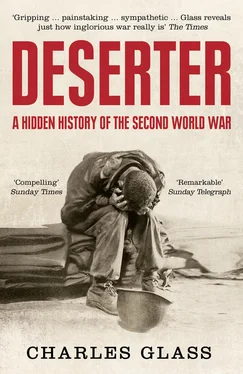Worst of all for the British, about 20,000 soldiers vanished from the ranks. Many took refuge in the Nile Delta, some living through brigandry and others surviving on the charity of the Egyptian peasantry, the fellahin . Many hid with girlfriends in Cairo. British Military Police, known as ‘redcaps’ for the colour of their headgear, established a checkpoint at El Deir on the road between Alamein and Amariya. ‘Every vehicle was checked, and personnel travelling eastwards as passengers had to satisfy the military police as to the authority of their journey,’ wrote Major S. F. Crozier of the Royal Military Police (RMP) and Provost Service. ‘Written orders had been given to this post to fire on any person failing to halt when called upon to do so.’ When some deserters drove off-road to avoid the checkpoint, the MPs placed the desert on both sides of the road under ‘continuous observation’.
The Middle East Commander-in-Chief, General Claude Auchinleck, believed the solution was for courts martial to impose exemplary death sentences. As early as April of that year, Auchinleck had written to the War Office requesting ‘that His Majesty’s Government may be pressed to give urgent consideration to the immediate introduction of legislation necessary to restore into the Army Act the punishment of death for the offences of Desertion in the Field and of Misbehaving in the face of the Enemy in such manner as to show cowardice’. Unlike the United States, Britain had abolished the death penalty for desertion. During the First World War, when the Americans had not executed any deserters, the British had put to death 304 soldiers for desertion, cowardice, disobedience and quitting their posts. Post-war revulsion at the firing squads had led the Labour Government in 1930 to override objections from military chiefs and prohibit the execution of deserters.
‘With the increase of number of troops in Egypt and Palestine, following the entry of Italy into the war [in June 1940], crime increased proportionately,’ wrote RMP Major Crozier. ‘Conscription had brought into the army a percentage of soldiers with criminal antecedents or tendencies. Many of these were drafted to the Middle East.’ Major Crozier, who believed there were too few military policemen to deal with criminal soldiers in Egypt, continued:
On arrival in Egypt they found that a number of soldiers had decided that the delights of Cairo and Alexandria were infinitely preferable to the monotony, discomforts and dangers of the Western Desert and East African campaigns. These deserters combined to form troublesome and dangerous gangs which were to become very familiar to the [Special Investigation] Branch [SIB] under the names of ‘The Free British Corps’ and ‘The Dead End Kids’.
Even before the fall of Tobruk, Major Crozier noted, ‘Not a day passed without many arrests being made.’ The RMP sent extra officers and men, many of them formerly with Scotland Yard, from Britain and the colonies, to deal with the caseload. It also recruited men locally from regular service battalions. Private Wilf Swales of the Green Howards transferred to the RMP in Egypt on the promise of ‘a shilling a day extra’.
Particularly worrying for the MPs were the theft and sale of British arms and ammunition. Zionist settlers in Palestine, planning their own war against the British, were major buyers of the looted Allied weapons. Two leaders in the Jewish Haganah defence force, Abraham Rachlin and Lieb Sirkin, were sentenced to seven and ten years respectively, for purchasing stolen arms. Their accomplices in the Royal Sussex and Royal East Kent Regiments received fifteen years penal servitude. Major Crozier wrote, ‘The number of thefts of arms of all types and ammunition was appalling, and the “Dead End Kids” were responsible for many of them.’ This deserter band befriended legitimate soldiers to gain access to bases and canteens, where they stole weapons, food, fuel and other supplies. The SIB shot and killed several of them. Another deserter gang calling itself the ‘British Free Corps’ survived by selling stolen military supplies, until its members too were caught.
Auchinleck argued in his letter of 7 April that nothing less than the death penalty would provide a ‘salutary deterrent in a number of cases, in which the worst example was set by men to whom the alternative of prison to the hardships of battle conveyed neither fear nor stigma’. In a memorandum of 14 June to the rest of the War Cabinet, War Secretary Sir Percy James Grigg appeared to support Auchinleck. He wrote:
My military advisers are unanimous in their opinion that the abolition of the death penalty for desertion in the field and cowardice in the face of the enemy was a major mistake from the military point of view. They hold that the penalty was a powerful deterrent against ill-discipline in the face of the enemy, which might so easily mean a lost battle and a lost campaign. In this connection it may be noted that the U.S. Army retain the death penalty for practically the whole range of offences to which it applied in the British Army in 1914–18 …
Grigg, a career civil servant whom Churchill had appointed Secretary of State for War the previous February, then turned from the purely military to political factors:
It is a subject on which there are strong feelings, and to justify a modification of the present law we should have to produce facts and figures as evidence that the British soldiers’ morale in the face of the enemy is so uncertain as to make the most drastic steps necessary to prevent it breaking. Any such evidence would come as a profound shock to the British public and our Allies and as a corresponding encouragement to our enemies.
He concluded, ‘Nevertheless, if military efficiency were the sole consideration, I should be in favour, as are my military advisers, of the reintroduction of the death penalty for the offences in question. But the political aspects are, at any rate, in present circumstances, as important, if not more important, than the military.’ Grigg asked Auchinleck for exact figures on the scale of desertions before the Cabinet could reach a decision.
Neither the 51st Division at sea nor the troops in Egypt knew of Auchinleck’s request to reintroduce the death penalty for those among them who might desert. It was kept secret from the public for the same reasons that Grigg opposed the death penalty itself: it would harm military morale, make the public more suspicious of the army command (which was held in low esteem by public and press alike at that time, as Cabinet minutes noted) and give the enemy a propaganda tool. Grigg explained in a memo to Churchill, ‘If legislation is necessary, the facts and figures must be serious. But if they are serious, we can’t afford to tell them either to our friends or our enemies.’ Moreover, Commonwealth troops serving alongside the British were not subject to the death penalty. Changing the law would mean that an Australian and a British soldier deserting together would receive very different punishments: the Australian would receive three to five years in prison, while the Briton would be shot.
The Australian and New Zealand commanders demonstrated more concern for the men’s morale than their British counterparts, who in correspondence complained of their soldiers’ ‘softness in education and living and bad training …’ The first units to establish forward clearing stations for psychiatric cases near the front were the 2nd New Zealand and the 9th Australian Divisions. By allowing the men to sleep and talk over their fears with physicians, the Australian and New Zealand medical staffs helped up to 40 per cent of the psychological casualties back into the field. The British followed suit in August, when the Royal Army Medical Corps’ 200 Field Ambulance placed an ‘Army Rest Centre’ near the Alamein Line. Brigadier General G. W. B. James, the psychiatrist who probably originated the term ‘battle exhaustion,’ wrote that of the men treated for it ‘a fairly constant 30% returned fairly satisfactorily to combatant duty’.
Читать дальше












